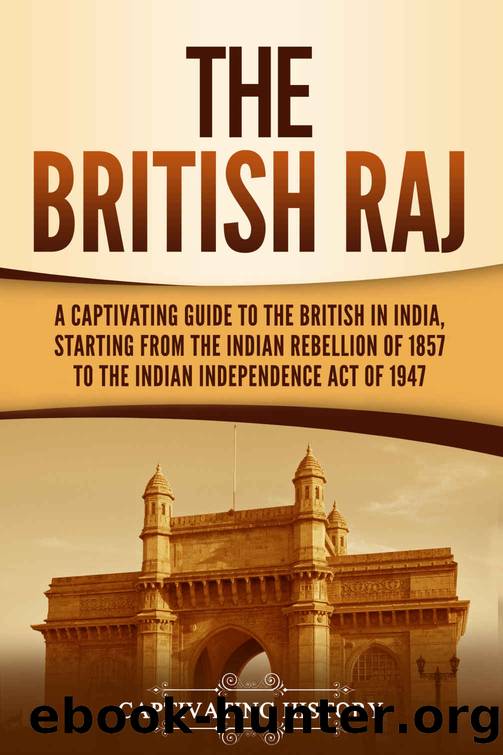The British Raj: A Captivating Guide to the British in India, Starting from the Indian Rebellion of 1857 to the Indian Independence Act of 1947 by Captivating History

Author:Captivating History [History, Captivating]
Language: eng
Format: azw3
Published: 2020-07-06T00:00:00+00:00
Chapter 5 â Nationalism in India
The Indian National Congress
In order to justify its government of India, Britain created a new middle class of well-educated Indians, whose employment in the government secured pro-Western and pro-British views of the local Indian population. They attended schools opened by the British government, and they were eager to get involved in politics with the goal of modernizing Indian legislation, economy, and society. After the Indian Rebellion of 1857, and throughout the 1860s and 1870s, the national awareness of the educated Indian middle class grew. It finally culminated in 1885 with the foundation of the Indian National Congress.
However, the educated Indians were well aware that they were under foreign rule and that they needed the help of British officials to be heard. Luckily, they had a retired British official named Allan Octavian Hume on their side. Together, they created an Indian National Union, which would work jointly with the British government. The Union had the task of being a mediator between the British government and the Indian people. They were the ones who made sure that the government heard the peopleâs opinion. With the British general elections coming up in 1885, the Indian National Union called upon the British people to give their votes to the candidates who best voiced their concerns about the social and political position of the Indians. They encouraged the people to vote against the taxation of Indians to finance British wars, and they gave their open support to the legislative reforms in India. However, the movement of the Indian National Union was a complete failure. The new Indian middle class finally realized that they could not expect the help of the British officials and that they had to fight their political battles alone.
So, on December 28th, 1885, the Indian National Congress was formed. Hume remained a supporter of the movement, which had now grown into a political party, and he assumed the position of general secretary. The first president of the party was Womesh Chunder Bonnerjee, an attorney from Calcutta. The first session of the new political party had 72 delegates in attendance, among them only two British members with the rest being Indians.
The Indian National Congress wasnât the first nationalist effort of the Indian people to have a say in the politics of the British government. There were many movements that came before the establishment of the political party, but they all lacked recognition. These nationalist campaigns had been mostly active in the political scene of India since 1875. For instance, the Indians protested cotton imports, as they wanted the textile industry to remain completely within India. The years of 1877 and 1878 saw the demand of Indianization of government services, as well as the opposition to the British efforts in Afghanistan. Many Indian presses supported the nationalist movements. In 1883, the Indian Mirror of Calcutta started its continuous campaign of promoting the need for an all-Indian political entity in the government. This campaign lasted until 1885 when the Indian National Congress was founded.
Download
This site does not store any files on its server. We only index and link to content provided by other sites. Please contact the content providers to delete copyright contents if any and email us, we'll remove relevant links or contents immediately.
Magic and Divination in Early Islam by Emilie Savage-Smith;(1530)
Papillon by Henry Charrière(1414)
Bohemians, Bootleggers, Flappers, and Swells: The Best of Early Vanity Fair by Bohemians Bootleggers Flappers & Swells- The Best of Early Vanity Fair (epub)(1394)
Ambition and Desire: The Dangerous Life of Josephine Bonaparte by Kate Williams(1380)
Twelve Caesars by Mary Beard(1310)
Operation Vengeance: The Astonishing Aerial Ambush That Changed World War II by Dan Hampton(1155)
What Really Happened: The Death of Hitler by Robert J. Hutchinson(1154)
London in the Twentieth Century by Jerry White(1141)
The Japanese by Christopher Harding(1129)
Time of the Magicians by Wolfram Eilenberger(1121)
Twilight of the Gods by Ian W. Toll(1110)
Lenin: A Biography by Robert Service(1071)
The Devil You Know by Charles M. Blow(1018)
A Social History of the Media by Peter Burke & Peter Burke(966)
Freemasons for Dummies by Hodapp Christopher;(960)
Napolean Hill Collection by Napoleon Hill(936)
Henry III by David Carpenter;(919)
The Churchill Complex by Ian Buruma(905)
The Rise and Triumph of the Modern Self by Unknown(904)
